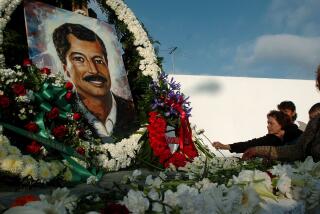U.S. Fights Release of 3 Salvadorans in Marine Deaths
- Share via
SAN SALVADOR — The U.S. Embassy filed an appeal Monday to prevent the release from jail of three prisoners accused of slaying four U.S. Marines and nine civilians at an outdoor cafe.
Counsel General Nicholas Ricciuti filed the appeal with a military court on behalf of the family of one of the slain Marines, an Embassy spokesman said. He declined to identify the family.
Judge Jorge Alberto Serrano said the Salvadoran attorney general also has appealed his decision last week that the alleged killers should be pardoned under a sweeping new amnesty law that forgives all political crimes.
The U.S. State Department denounced Serrano’s decision when it was issued last week, saying that “amnesty of these persons is morally wrong and politically damaging” and adding that “persons who have committed crimes of terrorism against American citizens should not go unpunished.”
Three to Stay in Jail
Serrano said the three prisoners will remain in jail during the appeal process. He said he expects to rule on the case by the end of the week. If Serrano accepts an appeal, the case will be forwarded to a military appeals court.
On June 19, 1985, rebels opened fire on two outdoor cafes in the fashionable Zona Rosa (Pink Zone) neighborhood of the capital. The four off-duty Marine guards were killed, along with two American computer technicians, five Salvadorans, a Chilean and a Guatemalan.
The Central American Revolutionary Workers Party, one of five guerrilla groups in the Farabundo Marti National Liberation Front, claimed responsibility.
The three prisoners have never stood trial. When presented to reporters by police in August, 1985, Willian Celio Rivas Bolanos admitted to the shooting; Juan Miguel Garcia Melendez said he was a member of the party but had no role in the attack; Jose Abraham Dimas Aguilar denied any involvement. He said his brother was a member of the party.
President Jose Napoleon Duarte put the amnesty law into effect Nov. 5 as part of a Central American peace plan. Under the amnesty, more than 425 political prisoners accused of ties to the leftist guerrillas have been released.
The law also forgives the thousands of rightist death squad killings committed in the early 1980s. The clandestine military and paramilitary groups murdered students, church and labor activists, human rights workers and even scores of members of Duarte’s Christian Democratic party.
Gunmen have been convicted in only two of the prominent human rights cases--the killing of four U.S. churchwomen in 1980 and the 1981 murder of two U.S. labor advisers and a Salvadoran agrarian reform worker.
Five National Guardsmen were convicted of murder, sexual assault and robbery in the case of the churchwomen. William Ford, the brother of Ita Ford, one of the victims, said in a telephone interview from New York that he is concerned that his sister’s killers will be freed under the amnesty. He plans to travel to El Salvador on Saturday to meet with government officials.
Ford said he received written assurance from the State Department that the guardsmen would not be released. In a letter from James P. Callahan, head of the El Salvador desk at the State Department, Ford was told: “We have been assured by President Duarte and by the president of the Supreme Court . . . that (the amnesty) should not apply to cases already adjudicated as common crimes. This would include the case of your sister and her companions and the Sheraton murders.”
Two gunmen were convicted in the killing of the labor advisers at the Sheraton Hotel. The triggermen claimed that they were hired by National Guard officials, but neither has been convicted.
Fifth Criminal Court Judge Gloria Palacios, who was to review the Sheraton case under the amnesty, resigned last week, saying she had received death threats. She declined to give specifics but claimed that the threats were not linked to the controversial case. A new judge has not been named to that court.
Among the most prominent cases that apparently are closed because of the amnesty is the 1983 “Las Hojas massacre” of between 19 and 74 Indian peasants on a farming community in the western province of Sonsonate.
Members of a civil defense unit and soldiers are believed to have killed the peasants, and the attorney general recently had sought the arrest of Col. Elmer Gonzalez Araujo, who oversaw the troops.
A judged ruled last week that the case fell under the amnesty. The attorney general also has appealed that decision.
More to Read
Sign up for Essential California
The most important California stories and recommendations in your inbox every morning.
You may occasionally receive promotional content from the Los Angeles Times.










